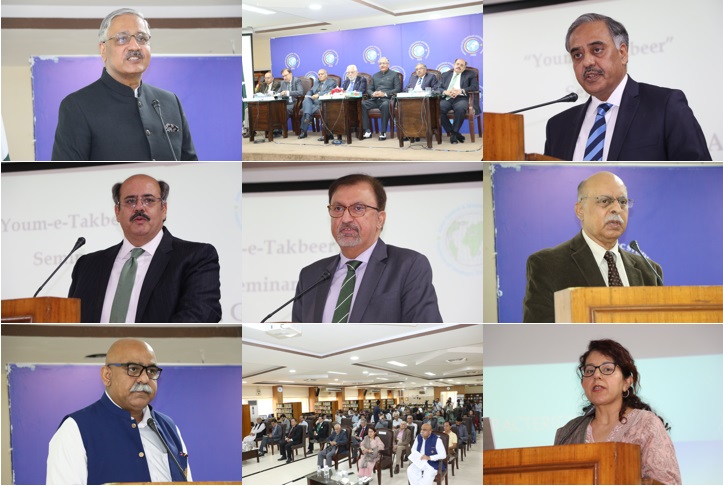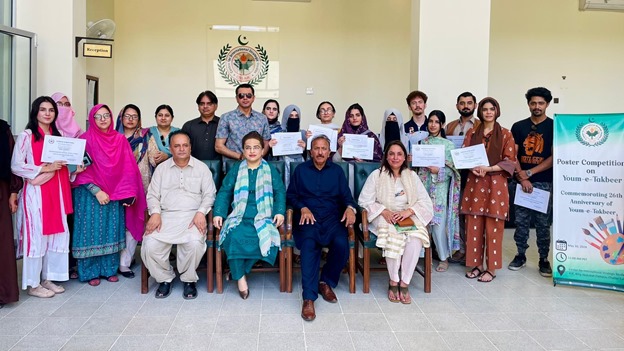Commemorating Youm-e-Takbeer, ISSI hosts Seminar on “Missile Developments in South Asia: Global and Regional Implications”
Press Release
As part of commoration of Youm-e-Takbeer, the Arms Control and Disarmament Centre (ACDC) at the Institute of Strategic Studies Islamabad (ISSI) hosted a seminar titled “Missile Developments in South Asia: Global and Regional Implications.” General (R) Zubair Mahmood Hayat NI(M) HI(M), former Chairman Joint Chiefs of Staff Committee was the chief guest. Distinguished speakers included: Dr. Zafar Nawaz Jaspal, Dean and Professor SPIR, QAU; Air Commodore (R) Khalid Banuri, Adviser Jinnah Centre for Character and Leadership (JCCL), AHQ Islamabad; Ms. Ghazala Yasmin Jalil, Research Fellow ACDC-ISSI; and Dr. Naeem Salik, President Strategic Vision Institute (SVI).
In his keynote address, General Zubair Mahmood Hayat provided a profound analysis of India’s ideological and strategic shifts. He began by commemorating Youm-e-Takbeer and emphasized that it was a day to reassert national pride and ownership. He stated that missile development in South Asia must be seen as a “tool” in the hands of the current political dispensation in New Delhi, which was effecting the ideological shift from ‘India to Bharat’. He argued that the RSS ideology driving this transformation has far-reaching ramifications at both regional and global levels. He asserted that an expansionist and revisionist agenda, now deeply influencing Bharat’s strategic intent, significantly diverges from India’s historical strategic culture. General Hayat highlighted the politicization of India’s military strategy, drawing from historical figures like Chanakya, whose principles emphasized power and deception at all costs. He pointed out that India’s aggressive missile developments, including deploying advanced systems like the BrahMos missile and developing MIRVs, reflect this new strategic posture. He emphasized that these developments pose significant regional and global security threats, necessitating Pakistan’s vigilant and comprehensive response.He also pointed out that India had the fastest growing nuclear program in the world, which remained opaque. Further, India’s nuclear and missile program was the result of vertical and horizontal proliferation. He stressed the need to have a deeper understanding of the ideological shift in India and the imperative for Pakistan to have appropriate counter measures.
In his welcome remarks, Ambassador Sohail Mahmood, DG ISSI, emphasized the pivotal moment in South Asia’s nuclear history on 28 May 1998 — marked by Pakistan’s response to Indian nuclear tests and the restoration of strategic balance in the region. He emphasized Pakistan’s commitment to maintaining robust deterrent capabilities and its role as a responsible nuclear state. He commented on the occasion of Youm-e-Takbeer and and said it was rightly termed as Pakistan’s “finest hour,” when the country demonstrated its technological prowess and unwavering national resolve. He extended sincere gratitude to all the leaders, scientists, engeeniers, strategists and diplomats who had contributed to making Pakistan’s defense impregnable. He elaborated on Pakistan’s post-1998 policy, emphasizing the country’s robust operationalized deterrent capability, the development of an impeccable nuclear safety and security regime, and Pakistan’s reinforced credentials as a responsible nuclear state on the international stage. He emphasized the importance of adopting a proactive, multidimensional approach encompassing diplomatic, technological, and military initiatives to mitigate risks and threats emanating from India’s advancements in missile technology.
Earlier, in his introductory remarks, Malik Qasim Mustafa, Director ACDC ISSI, welcomed the participants and highlighted the significance of Youm-e-Takbeer in reinforcing Pakistan’s national security and strategic stability in South Asia. He pointed out that India’s ongoing nuclear and military modernization drive, the development of advanced missile technology, and the recent tests of MIRVs and hypersonic missile technology pose a direct challenge to regional strategic stability.
Dr. Zafar Nawaz Jaspal discussed “Global Missile Developments and International Security,” tracing the evolution of missile technology and its proliferation. He highlighted the increasing security dilemmas and the rise in missile capabilities among major powers, including China, the U.S., Russia, and India. He explained the weakening of the Cold War-era arms control architecture and the strategic implications of integrating nuclear technology with missile systems.
Air Commodore Khalid Banuri discussed Indian missile developments, India’s ambitious missile programs, including the Agni-5 and MIRV technologies, and their strategic implications for Pakistan and China. He underscored the technological advancements and increasing range of Indian missiles, which pose significant challenges to regional security.
Ms. Ghazala Yasmin Jalil presented an in-depth analysis of India’s missile defence and hypersonic missile developments. She explained the technological advancements in hypersonic missiles and highlighted India’s pursuit of hypersonic missile technology, including the development of the HSTDV. She also examined the strategic implications of these advancements for regional stability and argued that the development of hypersonic missiles could destabilize the existing deterrence equilibrium in South Asia.
Dr. Naeem Salik discussed Pakistan’s global and regional missile development options. He discussed the development and deployment of ballistic missile defence systems, the rapid response capabilities of hypersonic missiles, and the strategic challenges posed by India’s missile developments. He suggested policy measures for Pakistan, including adopting a launch-on-warning poture.
The seminar concluded with a comprehensive Q&A session, followed by a vote of thanks by Ambassador Khalid Mahmood, Chairman BoG ISSI.



